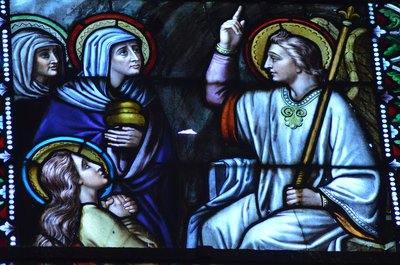Thoughts for the Day
Saturday, 22nd July 2023: The women of the Gospels
Mary Mary Magdalene Susanna Luke 8 Joanna Women
Reading : Verses from Luke, Chapter 8

Soon afterwards Jesus went on through the cities and villages, proclaiming and bringing the good news of the kingdom of God. The twelve were with him, as well as some women who had been cured of evil spirits and infirmities: Mary, called Magdalene, from whom seven demons had gone out, and Joanna, the wife of Herod’s steward Chuza, and Susanna, and many others, who provided for them out of their resources.
(Lectionary, New Revised Standard Version)
Thoughts
I was a pretty wishy-washy feminist. I could see things needed to change but preferred to do that by the way I carried out my for God. However, one day at a service in Worcester cathedral I was in my minor-canon's stall (with its misericord of a sow and its piglets!) and found myself next to a young male priest. When we sang the hymns, he began to change masculine references to feminine equivalents. It was annoying, but extremely thought provoking! Since then, new hymns books have done this, which isn't always successful.
Luke's Gospel is concerned with 'outsiders' - the sick and gentiles (who will contaminate ritual purity), and also with women and children. He is the only writer who mentions the names of the women who travelled with Jesus and who supported Jesus and the disciples financially.* They might not be able to preach or teach, but they gave what they could. Note also the mix of women involved, from Mary the fallen woman to Joanna the wife of Herod's steward.
Today, about 35% of all clergy in the Church of England are women, with about 25% of senior leadership positions held by women. In the wider Anglican Community countries as dispirit as Brazil, Japan, the US, Australia and South Sudan, with many others, have admitted women as priests and bishops. This is without all those involved in other Christian denominations. Perhaps today, then, we can give thanks for their work both past and present, in helping to spread the work of the Gospel around the world.
* Matthew does mention women stading afar at the crucifixion!
Prayer
Lord Jesus,
we thank You for the work of women
who have helped the Gospel message to grow
over the centuries,
and who used their talents to support the Church.
Today we also remember and give thanks
for those women who served You
in Your life on earth,
in particular Your mother Mary,
and Mary of Magdala, Joanna, and Susanna.
Amen.
You might like to look at the table produced by Wikipedia on churches in the Anglican Communion and the position of women:
If you would like a list of all the women mentioned in the New Testament with references, then this site gives it. Some like Salome you may not wish to know! If anyone is mad enough to read them all, do let me know, I will award a gold star: